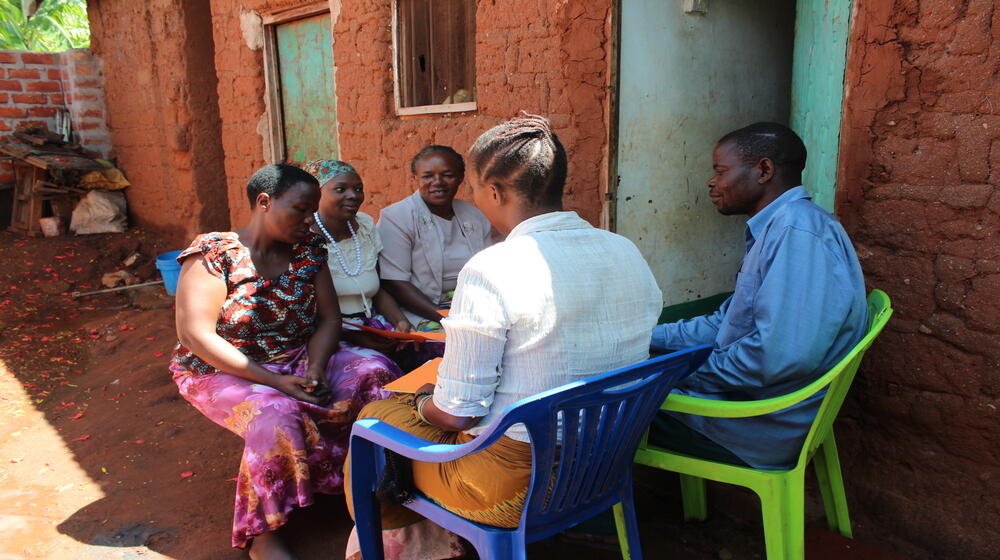Men in Tanzania continue to hold a dominant role in household decision-making. While 72 per cent of married women report participating in decision-making either alone or jointly with their husbands regarding their own health care, only 35 per cent of these women also reported participating in decision-making in major household purchases, and visits to their families and relatives (Tanzania Demographic Health Survey, 2015/16). Clearly there is room for growth in women’s participation in decision-making.
The involvement of men is a key strategy in efforts to support women to exercise their rights to access maternal, sexual and reproductive health services, and to end gender-based violence (GBV) and harmful practices. Men’s engagement is also an important entry point to change social norms, which are perceived informal rules on what actions and behaviors are acceptable in the communities. These principles were reflected in a training carried out by the NGO Tanzania Men as Equal Partners in Development (TMEPiD), which emphasized the importance of awareness-raising for men on sexual and reproductive health and rights (SRHR), gender issues and GBV.
Trained participant John Makotogu, a bodaboda (motorbike transportation) driver from Kishapu District in the Shinyanga Region, said “I used to believe that as a man I was supposed to be like a lion to my wife and family. I thought being a man meant I had to be dominant in the household. However, this gender training helped me to realize that GBV was not good for the health of my family. The knowledge I got from the training helps me to live harmoniously with my wife and family.”
John’s wife, Mrs. Evelyne Makotogu confirmed: “My husband is a changed man. There is no more mistreatment. He appreciates what I do for the family. He gives me space to plan, decide and work on my small business. We discuss and share issues. As a family, we are proud of him,” said Mrs. Makotogu.
My Rights My Choices Programme
The TMEPiD training is part of the Chaguo Langu Haki Yangu — My Rights My Choices Programme, implemented by UNFPA in partnership with TMEPiD and funded by the Government of Finland, which focuses on protecting the rights and choices of women and girls, particularly those with disabilities.
The three-and-half year My Rights My Choices Programme (2021–2025) is being carried out in two regions in mainland Tanzania and in two regions of Zanzibar. The Programme supports the Government of Tanzania, in alignment with the National Plans of Action to End Violence Against Women and Children of mainland Tanzania (2017/18–2021/22) and Zanzibar (2017–2022).
Training to Support Sexual and Reproductive Health
The first step of the TMEPiD training was to sensitize leaders of male dominated institutions who then identified 50 individuals to be trained as community facilitators (47 males and three females). Using the Ministry of Health SRHR training guidelines, the one-week training for community facilitators covered SRH promotion, sexuality education, behaviour change communication in sexuality and gender issues, and communication and facilitation skills.
The trainees were from professions including bodaboda drivers, pastoralists, fishermen and farmers, as well as from sports clubs, religious institutions, and prisons. Participants shared that enhancing involvement in sexual and reproductive health required them to first question their traditional understanding of masculinity and gender roles. They also recognized the importance of being informed on sexual and reproductive health and rights.
John Makotogu explained his colleagues’ perspective: “We bodaboda drivers now treat our wives and women in general with greater respect. The training helped us understand the effects of ill-treating women. The training helped us to change for the better.”
The trained community facilitators engaged and reached out to both adult and young men and women through a variety of activities and sessions including weekly meetings, sports activities, district and ward meetings, and events. In three months the community facilitators reached over 12,800 men and 2,300 women. One of the lessons learned during the outreach is that younger men were more open to change their attitudes toward sexual and reproductive health issues.
“Some changes have been noticed as men are now escorting their spouses to the clinic, accessing reproductive health services together,” said Verdinatus William, one of the trained community facilitators from Kahama district.
The couples visiting the health center together demonstrated that empowering community members, particularly men and boys, with knowledge of sexual and reproductive health and GBV, at the same time empowers women and girls to make informed decisions on use of sexual and reproductive health services.
Engagement of men is necessary to promote transformative gender equality where women are able to make decisions regarding their health care without fear of negative consequences, including gender-based violence. Access to SRHR is an important right for women as advocated for in the Agenda for Sustainable Development Goal 5: to achieve gender equality and empower all women and girls; and specifically Target 5.6, to ensure universal access to sexual and reproductive health and reproductive rights by 2030.


